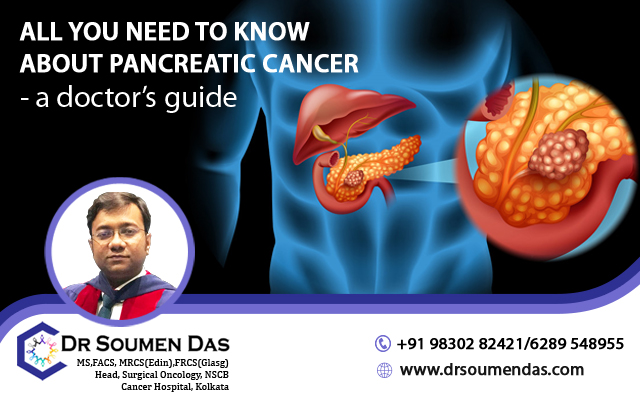Pancreatic cancer:
Abnormal growth of malignant cells in our pancreas tissues that gradually replace all our healthy tissues result in pancreatic cancer. The glandular organ that produces various digestive juices and enzymes is called the pancreas. The pancreas is located in our upper abdomen. Along with the progression of pancreatic cancer, extreme and sharp pain in the abdomen and bowel obstruction may occur, says Dr. Soumen Das, the best pancreatic cancer doctor in Kolkata.
When adverse DNA mutation occurs in the pancreas, cancer develops. Pancreatic exocrine cancer, commonly known as pancreatic ductal adenocarcinoma, is the most common pancreatic cancer that starts in the cells that line the pancreatic ducts.
Symptoms of pancreatic cancer should not be neglected, or else it may spread and affect other surrounding organs and cause further complications. Dr. Soumen Das is considered the best pancreatic cancer doctor in Kolkata.
Risk factors:
Other than harmful gene mutations, pancreatic cancer can get triggered by some other factors too.
The risk factors may include:
- Pancreatitis
- Diabetes
- Obesity
- Age (persons older than 55 are more likely to develop pancreatic cancer)
- Family history of cancer
- Excessive smoking
- Consumption of alcohol
- Substance abuse
- Gender (pancreatic cancer is more common in men than women)
Symptoms:
The best pancreatic cancer surgeon in Kolkata explains common symptoms that are experienced by patients who are infected by pancreatic cancer.
The symptoms are:
- Loss of appetite
- Sharp back pain or abdominal pain that persists
- Nausea and vomiting
- Unintended and unexplained weight loss
- Yellowing of eyes
- Dark urine that has a pungent smell
- Light stools
- Bowel obstruction
Stages of pancreatic cancer:
According to Dr. Soumen Das, the best pancreatic cancer doctor in Kolkata, there are 4 stages of pancreatic cancer.
Those are as follows:
- Stage 0: In this stage, cancer does not develop, and it can only be observed in the lining cells of the pancreatic ducts. This stage is not considered cancer.
- Stage 1: In this stage, a cancerous mass or a tumor can be found in the pancreas. Towards the beginning, the tumor remains tiny (less than 2 cm in diameter), and gradually it starts to grow in size.
- Stage 2: In this stage, cancer starts to spread and attacks the tissues, lungs, and lymph nodes that surround our pancreas.
- Stage 3: In this stage, cancer spread to the main blood vessels.
- Stage 4: This is the last stage, in which cancer captures all the major organs, including lungs, liver, and kidneys.
Treatment:
The treatment of pancreatic cancer includes surgery, chemotherapy, radiation therapy, or all of these as a combination. If pancreatic cancer progresses to such an extent that none of these treatments help, the best pancreatic cancer doctor in Kolkata will focus on your symptoms and try to ease your suffering (palliative care), and keep you safe as long as possible.







Leave A Comment